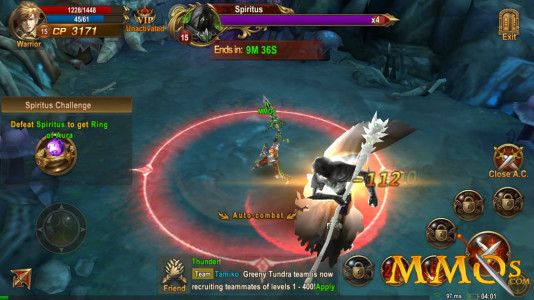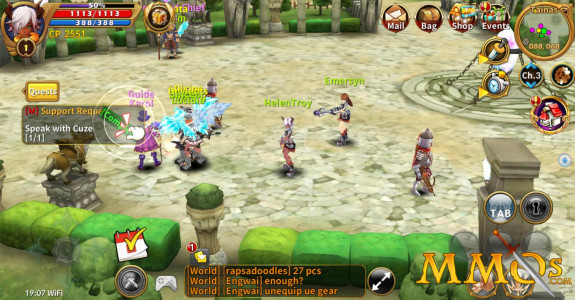The "WoW-Killer" Will Be A Mobile Game

If there is ever going to be a game that smothers World of Warcraft, it will be a mobile game. That’s if the fabled legend ever comes to pass—and at this rate, it won't be any time soon. I imagine for some readers this is a rather presumptuous statement to make. Afterall PC and console are still minting money, and they’re platforms that release “real” games—whatever that means. As argued on this site, by another [handsome] writer, PC and mobile will eventually merge and players will stop sharpieing “mobile” (or “console” or “PC” for that matter) as a preface. Instead, all games will be lumped under the “games” header, and at that point, perhaps, we’ll see the world addicted to the mobile “WoW-killer.”
This belief doesn’t stem from the merits of mobile gaming. Mobile is still heavily lacking, still in its early adolescence, figuring out the best way to pop pimples without looking like a flushed conformist. Sure, there are a few diamonds, amid an overflowing wasteland of regurgitated garbage. Browsing the app store, it feels like monkeys in a room programing and chucking whatever they come up with at the wall. Eventually—maybe sooner than I think—we’ll see higher quality productions; games that do something new. Then mobile will stop trying to fit in with the cool kids and learn to think for itself.
So, where am I going with this off-the-cuff rant? (Does anyone wear cuffs anymore?) My belief in the mobile “WoW-killer” is signalled more by the detriments of traditional mediums to play games: PCs and consoles.
Where do we start? Well, here’s one proposition.
No single PC title can gain traction because there is too much competition. While MMORPG development has slowed (beyond Kickstarter shenanigans), there is still an enormous saturation. Go on any Discord, and you’ll rarely find people playing games that repeat. Everyone plays their individual titles, and struggles to sell the games they like to even their closest friends. When there is too much competition, people aren’t happy with any singular choice.
Imagine a brand of sour candy. And now, let’s posit that there are 20 different brands, all using the same formula to make their special sweet treat—with some slight differences, like an extra squirt of corn syrup so that one can say, “Hey, we’re hip, not like those guys.” I’m no economist, but the idea that any single sour candy—with the same assortment of flavors—is going to dominate the market is ludicrous. There are too many competitors—and the newest one looks flashy until candy suckers grow tired and stick with whatever brand they chose first. With each trying to undermine the rest, what’s a consumer going to do?
They’re going to bounce. Players are going to try whatever game their favorite content creator starts highlighting: whatever the hype brigade starts flapping their meaty cheeks about. That’s where they’ll be. And only for a little bit. There are no more winners because novelty on traditional mediums is still a dream.
The other issue with traditional MMORPGs is they are expensive to make; my bajeezus, are they expensive to make. We’re talking millions in development costs, and years of hard work to make a product that may or may not succeed. Remember, these are people making these games. And people are fickle: management can be run by a megalomaniac who thinks a tripped out bus is a better a marketing campaign than running an ad on the Cartoon Network. Lot of risk involved.
Plus, MMORPGs are living products. I give some credence to the notion that they’re best understood as services, not games. Because they constantly evolve, so that an MMORPG on day 365 of its release should have matured (that’s a metaphor—whether or not reality agrees is different), thanks to a stream of updates, expansions, etc. Got to pay someone to watch the forums, got to keep paying your coders to dish out new content. This stuff adds up.
Then there’s the last looming issue. Everyone has a different PC. Now, this doesn’t apply—not as much—to consoles. Because, besides Nintendo, the other big boys in the room tend to stay more or less in line with one another as far as hardware is concerned. But when it comes to PC, there is a huge variety of systems out there; it’s rare that any two computers are exactly the same between people in the same circles. Developing a high quality and entertaining product for everybody means appealing to the lowest common denominator, which equates to cutting features or scaling back on scope to reach the widest possible audience. Also remember, EVERYONE has a mobile device, or will soon (keeping this article timeless).
And herein lies our conclusion. Mobile solves two of these three issues: they’re far cheaper to make and maintain; and everyone is running on similar enough hardware. The first will still be difficult to triumph. There’s plenty of competition, but from what I’ve played, most of that competition is copypasta’d ideas, or a reskinned makeover of formerly successful titles. No one—at least as far as mobile MMORPGs are concerned—has pushed design philosophy. And perhaps they can’t yet. Maybe mobile needs a few more years, and a more intuitive control scheme for the average aged MMO player (someone in their late twenties/early thirties) to ride a wave of success.
But just wait and see. If there’s ever a “WoW-killer” it will be on mobile.





